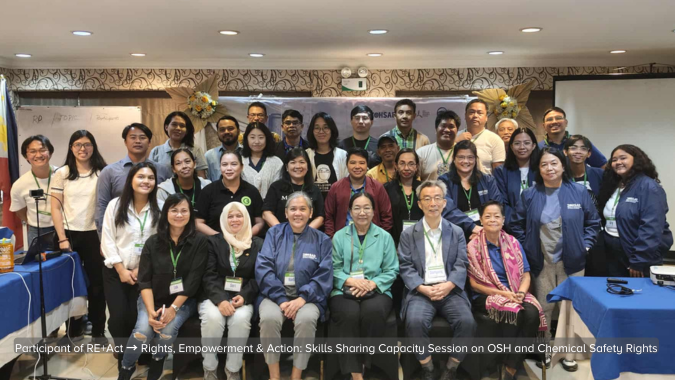Nine years after initial filing of the civil lawsuit by a group of 519 former Taiwanese employees of Radio Corporation of America (RCA) and their heirs against the company, and six years after the court started hearings on substantial issues of this case, lawyers on both sides finally debate each other at the Taipei District Court Friday, December 12. The court has allotted more than a hundred seats for the numerous observers expected to show up and observe the culminating event of this historic lawsuit.
Top academics, lawyers and judicial reform advocates will hold press conference on December 11 in support of the workers. On Friday morning, the former RCA workers’ organization and their legal team will hold their press conference in front of the Taipei District Court before the session begins. At noon, RCA workers’ choir and their supporters will perform a song written for their arduous campaign in front of the courthouse.
Struggle Began in 1990s after Plant Closure
RCA operated in Taiwan from 1970 to 1992. In the late 1990s, former workers started organizing themselves after the company was exposed to have been illegally dumping waste water onto the ground illegally throughout the years. They found unusually high proportion of themselves were suffering from various cancer and other grave illnesses, and believe their health problem to be resulted from years of exposure to toxic chemicals while working at RCA. With the help of Taiwan Association of Victims of Occupational Injury (TAVOI, 工作傷害受害人協會), they started to campaign for redressing their grievances against the company.
Lawsuit Filed Ten Years Ago and Trial Started in Late 2009
Later, with the volunteer legal team organized by the Legal Aid Foundation (法律扶助基金會), the RCA workers finally filed their civil lawsuit with the Taipei District Court in 2004 against RCA and its parent companies—General Electric of the US and Thomson S.A. (now Technicolor S.A.) of France. After years of procedural conundrum, the court finally started hearing on substantial matters of the case in 2009. The first witness, the cancer-inflicted former RCA worker Huang Chun-Tiao (黃春窕) started testifying at court on November 11 that year.
Company Admitted Pollution but Deny Responsibility for Human Illnesses Caused by Chemical Exposure
Because RCA claimed, after the outbreak of their pollution scandal, that all operational data had been destroyed by a warehouse fire, it is extremely difficult for scientific researchers to determine exactly what kind of chemicals had been used on production line and who had been exposed to what dosage of toxic chemical. Current mainstream science uses these data to determine causation between chemical exposure and illnesses. Thus, even though the Environmental Protection Agency had found that the soil and groundwater at the site of RCA Taoyuan Plant is heavily contaminated with chlorinated organic solvents such as TCE (trichloroethylene) and other toxic chemicals used in RCA’s production, the company admitted responsibility only to the pollution but denied all responsibility for illnesses of their former employees.
Plaintiffs Bring in Scientists to Establish Causation
To overcome obstacles posed by the company’s refusal to provide information, an academic advisory team for the RCA plaintiffs organized a series of scientific expert witnesses who have done extensive research on this case to testify at court. They formulate, defend, and explain their scientific arguments regarding relevant matters of fact and scientific opinions ranging from records of air pollution on the shop floor to principles of epidemiological causation. Patiently sitting through long court sessions and relentless cross-examinations by the defendant’s lawyers, these witnesses are among the first group of Taiwanese scientists who act upon their social concerns directly, in person, with their own scientific expertise, and not only with the social prestige they possess. One expert witness, Prof. Chen Pao-Chung of NTU Medical School, testified for 50 hours in 14 sessions.
First Group Litigation, Many to Follow
The RCA litigation is the first case tried in Taiwan under the new group litigation provisions stipulated in Article 44-1 of the Code of Civil Procedures. Passed by the Legislative Yuan in 2003; this article permits a charitable organization to file a collective lawsuit in the name of a large number of plaintiffs if the public interest is at stake. It can be interpreted as similar to the class-action lawsuits in the US, but the exact nature has to be established through actual legal cases. This provision is especially vital for the judicial system to deal with rising social controversies in our industrial age such the recurrent food safety scandals since 2011 that have ignited huge public outcry.
Occupational health and safety controversies such as the RCA case, along with environmental pollution and consumer liability such as food safety are essentially different sides of the same issue: interaction between hazardous chemicals with human body (and the ecosystem). Civil lawsuits on these issues are often referred to as “toxic tort” lawsuits. To date, performances of the judicial system in Taiwan have been unsatisfactory. In the 2011 DEHP plasticizer scandal, for instance, consumers are awarded as low as NT$ 9 each in damage by the civil court while the large food conglomerates Uni-President are awarded millions. Key problems in this case are exactly the central issues that has taken the RCA plaintiffs six years and countless efforts to address. Regardless of the final verdict, the pattern of mutual engagement between scientific and legal professions and the social movements built in the RCA campaign has lay the foundation for substantial progress in all three arenas.
High-Tech Model of Economic Growth under Trial
During its heydays, television sets and other products made at RCA Taiwan had accounted for substantial proportion of the country’s export. A collaborative technology transfer project between RCA and the Taiwanese government in the late 1970s trained the first batch of local semiconductor engineers; many of them later became industrial leaders in Taiwan’s high-tech sector. In this sense, the RCA trial is also a trial on the legacy of high-tech model of economic development. For this reason, it has generated enthusiastic participation of hundreds of volunteers throughout the years. An oral history of the RCA plaintiffs produced by the volunteers Voice Refused to be Forgotten (拒絕被遺忘的聲音) published early this year has been awarded the prestigious Golden Tripod Award for Best Book of the Year. This case is also closely watched by similar ongoing campaigns in other countries such as the Samsung Semiconductor Leukemia victim’s campaign in South Korea










